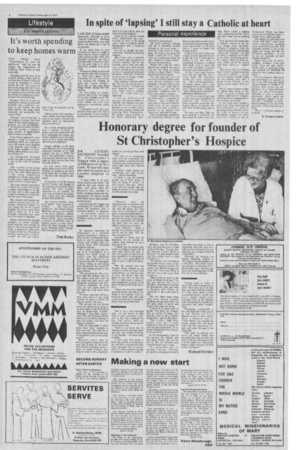Page 1, 15th April 1977
Page 1

Page 4

Report an error
Noticed an error on this page?If you've noticed an error in this article please click here to report it.
Tags
Share
Related articles
Awards For Hospice Founder And 'hitch'
Saturday
Youth Conference
Runcie Urges Hospices
Runde Urges Hospices
Dr Saunders to be given award
Next Monday Dr Donald Coggan, the Archbishop of Canterbury, will award Dr Ciceley Saunders a Lambeth Degree in Medicine. Dr Saunders is the founder of St Christopher's Hospice in Sydenham. She describes it as a Christian medical foundation for the chronically sick and in an interview this week talks about some of the attitudes to death and illness which she encounters.
Honorary degree for founder of St Christopher's Hospice
D R CICELEY SAUNDERS founded St Christopher's Hospice with a legacy of £500 given to her by a lonely 40-year-old man who died of cancer in a. London hospital in 1948.
"I want what is in your mind and in your heart," he said to her just before he died, and since then Dr Saunders has worked to build a hospital home for the chronically ill which would offer them more than simply medical care.
Next Monday Dr Coggan, the Archbishop of Canterbury, will award Dr Saunders with a Lambeth Degree in Medicine — an honorary award in recognition of her particular Christian service to the care of the sick.
Dr Saunders describes St Christopher's as a Christian medical foundation seeking to offer the best professional standards of care to patients with chronic and terminal pain, especially those with advanced malignant disease.
She is swift to dispel any image of St Christopher's as a hospice for those dying of cancer, and the emphasis within the hospital is on creativity and life. Dr Saunders is more willing to talk about their advances in the control of pain than helping people to die happy deaths. "We treat patients who come here with the attitude that we can relieve their pain, and we can help with their social and emotional problems and their spiritual problems. In most cases we will enable them to live fully up to the time when they die. "In some cases this will be a short time, and in a very small number of cases it will be till they get better," she says. The patients for the 54-bed home are drawn from about a six-mile radius in the Sydenham area of South-East London. Although it has close connections with the National Health Service, it is a charity relying on gifts and grants, and does not charge its patients.
What St Christopher's offers more than other hospitals is time and care. The staff try to take a personal interest not only in the patient, but in the family as well.
Relatives aren't seen as honorary guests a little bit in the way, but as part of the team. The hospice is backed up by a team of social workers who keep in touch with a bereaved family for as long as they need support.
The aim is to reintegrate them into the community, but many families come back to the monthly party at the hospice for some time after their relative has died.
"Hospice really means low technology and high person care," says Dr Saunders.
Is there a case for putting people out of their misery if they are dying of cancer? "It isn't misery," she says. "There is no need for people who are dying of cancer to be suffering unrelieved pain these days.
" "Misery may b e breathlessness or weakness, but there are ways of helping people with the things that they can't do for themselves which don't erode their independence. Nausea and vomiting are things that we are always researching. We are much better at controlling them than we were, but there is always more to learn. "Last weekend I asked a patient if he found it tough being ill, and he said: 'Yes, but there are gains too.' " Attitudes to death, says Dr Saunders, are not isolated attitudes: they depend on one's attitude to life.
"1 think that the person who thinks of religion as just a bit of extra help which you may or may not .require on top of your own capabilities is not going to find this a very strong kind of faith to have in times of adversity.
"But the person who has thought about religion as an attempt to find out what God wants of him, not what he wants of God, the person who has learnt to say 'Yes' to life and 'Yes' to what God is asking of him through life, is going to find that it all goes in the same direction.
"There are one or two simply splendid people like this in the wards at the moment. One is a Salvation Army lady who said to me the other day: 'I am by no means wasting my time here'.
"She is on a slow downhill path, and she knows it. Her faith is quite obviously a support to her and a demand on her. The person with the deepest faith may be the person who is most tried.
"There is no doubt that St Theresa of Avila was right when she said: 'No wonder God has so few friends — he treats them so badly.'
"I have seen how tested a believing person is sometimes, but also how marvellously they come through with an acceptance of what is happening and a readiness to make it creative."
Religion, says Dr Saunders, does not give believers a false sense of security. "You get people who say 'I know there's a Heaven!' but that doesn't mean that they simply want to jump into Heaven.
"The person with real faith is the person who is ready to say: 'Whether I am here or there, no matter how difficult things are, I am with Christ and Christ is with me. I am ready to go when he says so.'
"That is like the thief on the cross to whom Christ said: 'Today you will be with me in Paradise'. That didn't mean that he immediately died and went to Paradise with Christ; he remained on the cross next to him.
"On the other hand those who have never trusted anything during their lives are the most likely to panic and despair when they are dying.
"1 think it is those kind of people who have not trusted, who are afraid of things, who feel they have to be in control all the time," says Dr Saunders.
"That is why I think those people who say 'I want someone to put me to sleep if 1 ever become dependent' are so afraid of death that they want to try to control it."
At St Christopher's most of the patients are elderly, and only about 20 per cent are under 50. But Dr Saunders says maturity doesn't go in years.
"It's personality and experience," she says. "You may get quite a young patient who is amazingly accepting of what is happening and you may have older people who cannot accept that they are coming to the end of their life."
Although the hospice has regular chaplains, religion in the hospital is a dynamism, not a formality. "We aren't relieving pain just for the sake of it," Dr Saunders says, "but because this is an important part of life that can he very fulfilling.
"People need to come to terms with what is happening to them when they are ill so that they can share with their family. If it has never been a communicating family, maybe you won't make them communicate: but, as Dr Johnson said, 'the prospect of death concentrates the mind wonderfully'. "Sometimes catastrophe is the one thing that helps people to talk. People can live a lifetime in two or three weeks. What a Christian says is: 'Christ shares this because he totally shared life and death with only the equipment of a man and came through to the other side ...'
"One goes in feeling that we've got empty' hands, but knowing that ours are the only hands and that although Christ is in the helper he is also in the helped simply because of what he has undergone."
blog comments powered by Disqus









